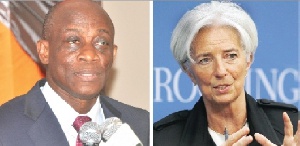A new IMF report is forecasting Ghana’s public debt to hit 65.3 percent by year-end -- a figure that will mark the highest in a decade when the total public debt hit over 80 percent in the mid-2000s.
The latest IMF Fiscal Monitor report released Wednesday also projects the debt levels to peak at 71.1 percent in 2015, before easing to 68.3 percent two years later.
Commenting on Ghana’s debt level, Sanjeev Gupta, Deputy Director, Fiscal Affairs Department at the IMF said: “Given the debt levels, and given that there is pressure that is coming up within the system itself, it would be a good idea to consolidate sooner than later; and this would entail trying to restrain pressures on wages, containing the outlays on subsidies.
“Of course, while establishing appropriate targetted social safety nets. And also improving the quality of spending that is taking place, so that overall in the end there is an improvement in outcomes,” he added.
Government’s response to the rising debt level, which is inching closer to the unsustainable threshold, was to seek an IMF programme in order to ensure a much more prudent fiscal regime.
The Fund has a history of delivering such benefits -- but always at very great cost. It is this cost that must now be negotiated following the President’s directive to his advisors “to open discussions with the IMF and other development partners in support of our programme for stabilisation and growth”.
The IMF mission, which concluded its first round of discussions on a possible programme for Ghana, noted that the economy is vulnerable to many shocks -- further stressing that the country’s economic growth at the end of this year will slide from the 7.1% recorded last year to 4.5%, which could be the lowest GDP growth in more than a decade.
Mr. Joël Toujas-Bernaté who led the IMF mission stated: “Ghana continues to face significant domestic and external vulnerabilities on the back of a large fiscal deficit, a slowdown in economic growth and rising inflation.
“These vulnerabilities are putting Ghana’s medium-term prospects at risk. The mission estimates growth to decelerate to 4½ percent in 2014 from 7.1 percent in 2013, and inflation to reach an average of around 15 percent for the year.”
The Fiscal Monitor was launched in 2009 to survey and analyse the latest public finance developments, update fiscal implications of the crisis and medium-term fiscal projections, and assess policies to put public finances on a sustainable footing.
Business News of Saturday, 11 October 2014
Source: B&FT

















